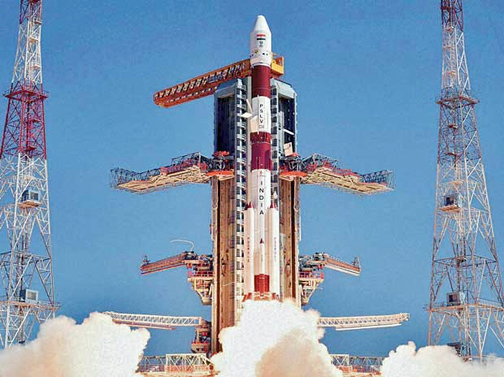
At the Business Standard infosite, an article has been posted that indicates India’s space agency, Indian Space Research Organisation (ISRO), plans to launch a navigation satellite that the organization will jointly build with a private firm by March of next year, starting a process to outsource satellite manufacturing and free the ISRO's resources to focus on research and deep space missions.

An ISRO PSLV rocket launch.
ISRO has received more than 40 responses to a tender floated inviting private firms to jointly build a satellite and eventually transfer satellite-making technology for local and global needs. The Indian space agency plans to hand-hold vendors to jointly build, test and certify two navigation satellites that would be launched to join the fleet of seven Navic satellites that are already in space.
India, based on current needs, requires to launch a satellite every month over the next five to seven years to meet growing needs of local customers for DTH broadcast, mapping applications for urban and disaster planning, and communication services. Simultaneously, ISRO is also sensing an opportunity to replicate India’s success in IT outsourcing in building satellites for global firms and launching them from Indian soil. There is a global surge in new satellite companies, such as One Web, Google-owned Terra Bella, Planet Labs — which was founded by three former NASA scientists, Chris Boshuizen, Will Marshall, and Robbie Schingler — Spire Global, Space X, and Millennium Space Systems, who collectively plan to launch over 2,500 new satellites over the next few years.
The bulk of these satellites are small for areas such as remote sensing and navigation, disaster management, intelligence gathering and providing high-speed internet services. In June, ISRO had invited over 100 firms, majority of them component and systems suppliers such as Godrej Aerospace, Tata Advanced Material Systems, Hindustan Aeronautics, and Bengaluru-based Avasarala Technologies to showcase satellite-making opportunity to meet both local and global needs.
Research and Markets estimated in May that the global opportunity for smallsats would grow nearly one and half times to $5.32 billion by 2021. In 2016, the market was estimated to be worth $ 2.22 billion. For ISRO, a few firms based in Silicon Valley such as Planet Labs, Terra Labs and Spire Global are already customers of the agency, using the PSLV rocket to hurl satellites into space. Now, ISRO is looking to expand the relationship with them and other firms to make satellites locally in India.
ISRO is also stitching together an industry consortium that they expect to build and launch the Polar Satellite Launch Vehicle (PSLV) by 2020, while the organization focuses on developing newer rockets to reduce the cost of space transport.

